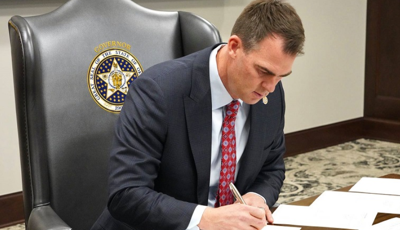
Stitt
OKLAHOMA CITY - Oklahoma has joined more than half a dozen states that have placed strict controls on third-party litigation funding, including transparency requirements on foreign funders.
Gov. Kevin Stitt signed the Foreign Litigation Funding Act into law last month, following similar action in Georgia in April. Wisconsin, Indiana, Montana, West Virginia, Louisiana and Kansas have also passed TPLF transparency laws, most of them including specific rules for foreign entities that critics fear may be using litigation to damage businesses and influence policy in the U.S.
Despite the bill’s title, the Oklahoma law was intended to address all forms of TPLF by requiring funders to identify themselves to the court and adhere to rules prohibiting them from being involved in decisionmaking about the course of litigation. Litigation funders invest in lawsuits, covering fees and costs in exchange for a share of any winnings.
They can charge rates that would constitute usury, but since they receive nothing if the case fails, the arrangements aren’t considered traditional loans subject to that regulation.
“We had gotten feedback from a lot of members who saw the same fact patterns across a number of jurisdictions,” said Adam Maxey, vice president government affairs with the Oklahoma Chamber of Commerce, which promoted the bill. “The suit from New York who comes into the courtroom, checks in and leaves.”
The new law requires parties to supply, upon request, TPLF contracts as well as disclosing whether any foreign entities have supplied money to the funders. The information is only disclosed to the court and opposing parties and cannot be used as evidence.
As with other states, Oklahoma exempted lawyers working on contingency, since their arrangements are regulated under state bar disciplinary rules. The state also exempted consumer litigation funders, who extend loans to plaintiffs with repayment contingent upon a settlement or court judgment.
The U.S. Chamber Institute for Legal Reform, the American Tort Reform Association and other business groups have pushed TPLF transparency laws to combat what they believe is hidden influence by hedge funds and foreign entities to stimulate and guide U.S. litigation.
The laws requiring foreign funders to disclose themselves reflect concern that overseas entities may be using U.S. litigation to advance their interests. Climate lawsuits against the oil industry, for example, are funded in part by “dark money” groups that may be receiving money from oil states interested in curbing U.S. energy production.
ExxonMobil has sued California Attorney General Bob Bonta, the Sierra Club and an Australian charity, alleging they worked together to sue over Exxon’s recycling business when the ultimate funder of the Australian charity is a mining magnate with competing businesses. Bonta launched a recycling lawsuit against ExxonMobil the same day as environmental groups, the company complains.
One of those groups, the Intergenerational Environmental Justice Fund, created by Australian billionaire Andrew Forrest of Fortescue Minerals, hired lawyers at Cotchett, Pitre & McCarthy who were forced to register as foreign agents.
The lawsuit is “a case about the corrupting influence of foreign money in the American legal system and about the sordid for-profit incentives and outright greed that tries to hide behind so-called public impact litigation,” Exxon said in its own suit.
The Georgia TPLF law goes further than Oklahoma’s, banning foreign involvement in state litigation outright.
Maxey, of the Oklahoma Chamber, said no specific examples of foreign involvement came up during the debate over the bill but as an oil- and gas-producing state Oklahoma has reason to worry.
“We don’t know what we don’t know until the law goes into effect,” he said.








